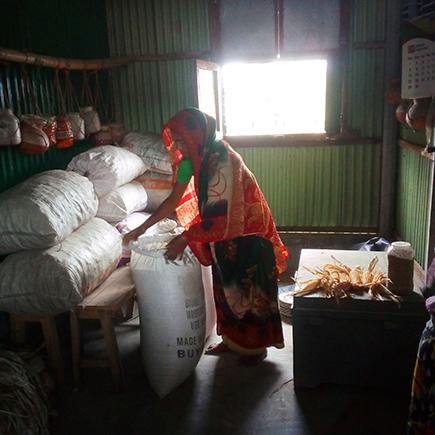Our future is in respect for natural ecosystems

This opinion piece was written by Catherine Gatundu, ActionAid International's International Policy Advisor - Livelihoods
It’s ironic that we are celebrating this year’s day of biodiversity locked away in our homes due to the coronavirus pandemic. The pandemic highlights the importance of testing alternative models for climate justice, sustainable agriculture and food production through agroecology, and an end to natural resource extraction through community-based, sustainable natural resource management. Yet, around the world, we continue to see a scramble for land-based natural resources, often driving conflict and violence.
Agroecology has increasingly under attack recently, especially from those sympathetic to the extractive model of agribusiness that concentrates land and agriculture resources in the hands of few, and impoverishes the majority (see this and this for examples). Similarly, the environment and land rights defenders face similar attacks and few of them have access to media platforms to relate and share their stories. By protecting such resources for the common good, they find themselves directly in the way of others who want to profit from these natural resources. If their lives were at risk before, this global pandemic has only exacerbated an already difficult situation. When a community goes into lockdown, defenders not only become easier to target, they lose their right to protection while the attention of the media is elsewhere.
There is a documented increase in the number of direct attacks on land and environmental human rights defenders (EHRDs), especially those in regions rich in valuable resources such as forests, mines or rich agriculture soils. In one year alone, Global Witness documented more than three killings of EHRDs per week in 2018.

Yet, even while these defenders of nature are dying, we are now confronted with the reality that their death was actually to protect all of us. A wake up call came from the report of Intergovernmental Science-Policy Platform on Biodiversity and Ecosystem Services (IPBES) - the Global Assessment Report on Biodiversity and Ecosystem Services in 2019. The report, released on 6th May 2019 presents the alarming reality of fast paced extinction of species across the biodiversity spectrum. “Ecosystems, species, wild populations, local varieties and breeds of domesticated plants and animals are shrinking, deteriorating or vanishing. This loss is a direct result of human activity and constitutes a direct threat to human well-being in all regions of the world,” notes co-author of the report, Prof. Settele.

Emerging literature seems to suggest a strong connection between ecological degradation and emergence of disease epidemics, even warning that more epidemics are on the way. The authoritative report of the IPBES (2018) indicates that, in the last 50 years, seventy-five per cent of the land surface has been significantly altered, 66 per cent of the ocean area is experiencing increasing cumulative impacts, and over 85 per cent of wetlands by area has been lost. Yet, both the IPBES report and the IPCC’s special report on Land and Climate Change flagship report clearly call for stronger land and natural resources tenure rights for communities and women as the only way to guarantee that these resources are sustainably managed. This echoes ActionAid’s clarion call for secure tenure rights for women and communities that directly depend on these natural resources, and a reduction in commodification of natural resources.
Rampant extractivism and the destruction of ecosystems are affecting communities that are already susceptible to the negative impacts of climate change, hunger, and ecological degradation. They are also more likely to be more negatively affected by the effects of COVID- 19. However, the same communities hold the key to building systems of resilience to this and similar pandemics.
It has been argued that the agro-industrial complex is responsible for the emergence of new pathogens affecting humanity today. The hybridization and genetic modification of crops and animals, the production of genetically identical beings, is thought to diminish not only the host base for pathogens, but also aid in their mutation and the emergence of novel pathogens never seen before. Agroecology practices offer a way out of this quagmire by providing bio-diverse ecosystems, including agricultural ecosystems, that serve the demands for food and feed, but also support ecological integrity.
Our solutions are in nature. As is the case with climate crisis, the ecological crisis affects first and foremost those least responsible for causing it; women and communities whose livelihoods directly depend on such ecosystems. Biological diversity and integrity can only be ensured by supporting, listening to and learning from environmental rights defenders and their communities. Our collective awakening around biodiversity loss, agricultural ecosystem degradation and climate change must build from indigenous peoples, local communities, women and other smallholder farmers’ systems and not be used as an excuse to further alienate them.
Our strategies must focus on providing support to indigenous people, local communities, women and smallholder farmers so that they can continue producing food, looking after and managing ecosystems, building on their indigenous knowledge, shared farmer to farmer learning as well as applying farming methods that are proven to protect and work with nature - agroecology.


